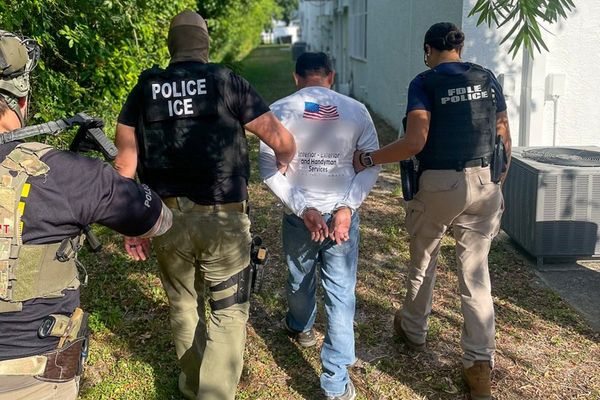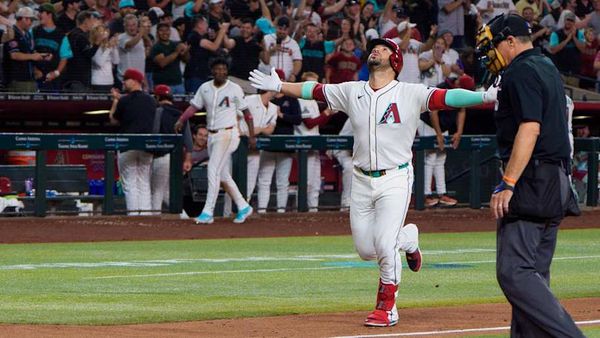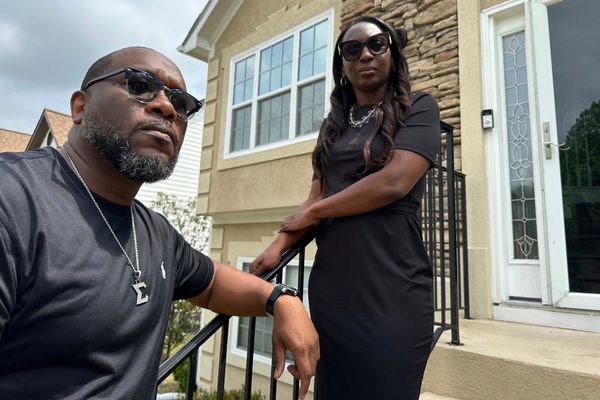NEW ORLEANS — Before Villanova jogged onto a basketball court laid down inside a football stadium, the Wildcats gathered in a tunnel outside their temporary locker room. Blocked off by security guards, they huddled close and took turns screaming. Let’s f------ go! We know what this s--- is! Stay together! Believe! They turned and headed out, together, hearts full of determination and resolve, ready to seize a game few thought they had a chance to win.
Were this an underdog sports movie, the scene would have made for a good open, or climax. But this was not an underdog sports movie. This was Kansas, mighty Kansas, a deeper team with more experience, more NBA prospects, better statistics—higher averages of just about everything; points, rebounds, blocks, steals, assists— and, notably, better health. As if anyone needed a reminder, television cameras zoomed in on Jay Wright, the Villanova coach, comforting Justin Moore, his injured guard, as the starting lineups were announced on Saturday without Moore in his usual slot.
For the next two hours, a basketball game transformed into a demolition derby that doubled as a reaffirmation of Kansas men’s basketball and its national title chances. The message the Jayhawks delivered on Saturday hit with the force of a Mike Tyson uppercut landing flush on a suspect chin.
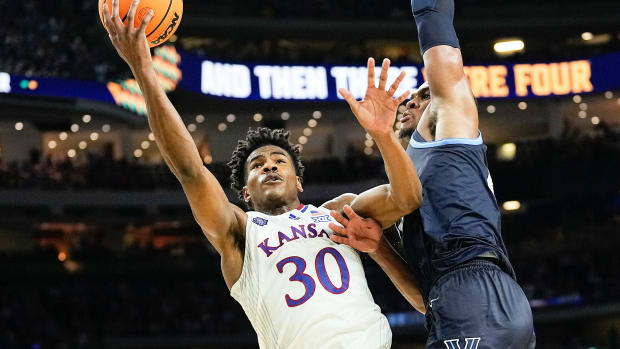
David J. Phillip/AP
The rest of the sports world could focus on and obsess over Mike Krzyzewski’s final NCAA tournament run, a historic installment of the unparalleled Duke-UNC rivalry and the potential of a rare fairytale ending for a sport in short supply of moments untinged by one scandal or another. Kansas would show up on Saturday and convey that message, emphatic reminders of a program, its proud history and its latest team, now one victory from cutting up another pair of nets on Monday night.
Reminder: Kansas arrived here as the only No. 1 seed left in this NCAA tournament. Reminder: the Jayhawks have won 33 games in 2021–22, shared the Big 12 regular-season crown and cruised through the conference tournament. Reminder: on March 25, Kansas passed Kentucky for the most wins in the history of men’s college basketball.
And yet, those same Jayhawks also received an unusual reception upon arrival here, their presence—and that of the “other” national semifinal game—greeted by something like a sad trombone medley. “We’re jacked,” coach Bill Self said, his delivery amplified with unexpected enthusiasm. It seemed like he was imploring everyone else in town for the Final Four to join him. But most were too busy wondering what Coach K might eat for his last supper.
No matter. The Jayhawks arrived here on a mission, without any nostalgia, with their own history to make. They waved away the NCAA investigation hanging overhead. Then they walloped a good-but-overmanned opponent, from the opening tip to the final buzzer, winning easily, 81–65. Their victory, in both style and thoroughness, reminded a nation of college basketball fans obsessed with every Krzyzewski hand movement that perhaps the widespread belief in the inevitably of a Duke title was, at the very least, a little wishful or premature.
Almost as soon as Kansas left the floor, players from Duke and North Carolina started to warm up. Perhaps they had noticed on their way in how the Jayhawks had not celebrated, had not even so much as smiled. Instead, they projected a quiet confidence that contrasted with their statement victory. It was like they knew something that others didn’t. Something those others would find out soon enough.
“I thought we played great,” Self said afterward, his enthusiasm already waning.
In some ways, the disinterest of Kansas-Villanova centered on the Wildcats, who were busy cobbling together another game-plan adjusted for injury to worry about things like interest. In the cruelest of all twists, Moore tore his right Achilles in the final minute of his team’s last game, an ugly win over Houston made even less appealing when Villanova lost a cornerstone for the remainder of the tournament.
Fans packed into the Superdome, anyway, forming the first full-Final Four crowd since the global COVID-19 pandemic wiped out the tournament in 2020. They were early. They were loud. Many appeared gloriously lubricated, and who could blame them? The four teams left in this men’s college basketball season could boast of 17 combined national titles.
Kansas staggered Villanova right away; the Jayhawks threw the ball inside, grabbed offensive rebounds and forced turnovers, and the combination opened a 10–0 lead that would never be relinquished. Ochai Agbaji pushed the Wildcats in front, which was surprising and not surprising at all. This was the same guard who hadn’t received a Power 5 scholarship offer until the final semester of his senior year in high school, who went to Kansas, to play for Self, the one coach who believed in him. He became an All-American and won everything in sight this season: Big 12 Player of the Year, Big 12 tournament MVP, Big 12 title.
Self liked to say that Agbaji reminded him of Danny Manning, one of the best players in the history of a program laden with worthy candidates. But Agbaji’s scoring had dropped in the NCAA tournament, bottoming out with a five-point effort in Kansas’s win over Providence in the Sweet 16. He had broken 20 points only twice in the Jayhawks last 10 games. But there he was, early into the “other” game on Saturday, setting up on the left wing and knocking down three-pointers like he was supposed to hit them. He made his first four attempts from beyond the arc, and by that point, Agbaji had outscored Villanova all by himself.
Perhaps this is what Self had meant last week, after his team topped Miami to seal its return to the Final Four. He told reporters the Jayhawks’ “best moments” were still ahead of them. It sounded a little bit like coach-speak, or wishful thinking. But here’s the thing: he wasn’t wrong.
Kansas lost to Dayton early into the season. It stumbled against Texas Tech, Kentucky and Texas, too. No shame in that; good teams, all. But as February turned to March, back-to-back and double-digit losses at Baylor and at TCU sounded a few alarms. Rather than panic, or institute dramatic change, the Jayhawks did what programs like theirs do. Self called on Remy Martin, the speedy guard who was named the preseason conference player of the year, only to injure a knee in late December that had limited his role ever since. As Martin started to return to his dizzying form, the Jayhawks won nine straight.
As Kansas tried to right a season gone wobbly, Martin took back his starring role. Self needed that against Miami, in the Elite Eight, a round that has become something of a program nemesis. Before this season, Self had reached that round— so close to the Final Four, yet still so far away—on 10 different occasions. He had lost seven of those games, including five times at Kansas. “Not good enough,” he said. The Jayhawks trailed the Hurricanes as well, before putting on a second-half showcase of what the optimal version of Kansas looked like. KU won by 26 points, tied for the largest margin of victory in tournament history by a team that was losing at the half. Agbaji finished with 18 points, a good sign. Martin won most outstanding player honors for the Midwest regional; an even better one.
A sideline reporter for CBS asked Self about his father, Bill Sr., who died at 82 years old in January. Self called the season special and invoked one of his father’s favorite sayings. Don’t worry about the mules, just load the wagon. Meaning don’t worry about a halftime deficit in another Elite Eight game gone awry. Or don’t worry about making another Final Four and still being overshadowed, despite owning the highest seed of any team remaining.
As the first half continued against Villanova, Kansas just kept loading wagons. There was David McCormack, throwing down dunks and slapping not just his chest but, oddly, the sides of his own head in celebration. There was forward Jalen Wilson driving and distributing, scoring when needed and doling out assists. And there was Dajuan Harris Jr., another guard who Self admits might be his “favorite,” for numerous reasons. Harris, Self explained, understands basketball, loves the game and dealt with losing his father and a brother while playing for KU. Harris says he still doesn’t know how his father died. He might wish he didn’t know what happened to his younger brother, Dajion, who was shot by a friend, according to police.
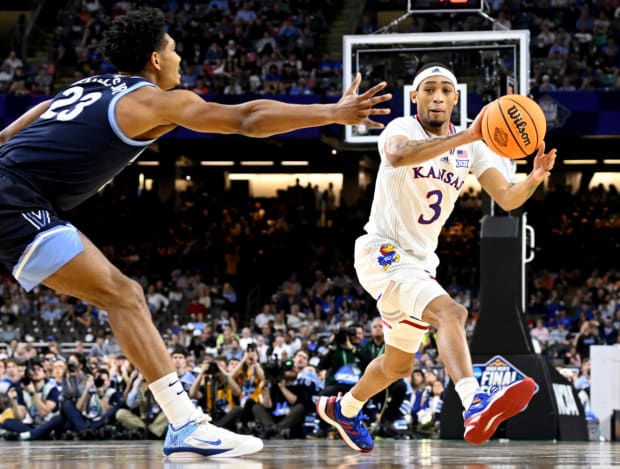
Greg Nelson/Sports Illustrated
Every time that Villanova inched back in, it seemed like Harris answered with a triple. And each three-pointer made, each run quelled, emphasized the larger, obvious point. Kansas was the more talented team, the deeper team and the healthier team. Villanova scrapped valiantly, over and over, sometimes even cutting the deficit to single digits. But it never really felt like the Wildcats had a realistic chance to win.
Villanova seemed to play with increasing desperation. The Wildcats forced shots and threw passes into traffic. Kansas might have felt the same way—after all, the Jayhawks had been the tournament’s No. 1 overall seed two seasons ago; alas a champion was never crowned—but it played more with purpose. The 2020 tournament had never taken place. The ’21 version didn’t resemble normal, and the Jayhawks had been bounced in the second round, out-muscled and punked by USC. The players who remained from those teams considered this postseason their final chance to take care of the unfinished business.
Perhaps Kansas was steeled by the past two seasons. Maybe it just wanted, even needed, to win. The Jayhawks certainly were experienced, their roster full of seniors and super seniors and players who had lived through so much uncertainty and turbulence. But the romp over Villanova set up the ultimate path to writing a better ending.
Regardless, Kansas led, 40–29, at the break. After another three-pointer from Harris, they had extended their lead to 16 points. The Wildcats had not controlled the pace, had not limited the Jayhawks possessions. Had Villanova done both, it’s likely the loss would have been simply less lopsided, not transformed into an unexpected triumph.
Midway through the second half, Wildcats guard Caleb Daniels missed a three-pointer from the wing. Had it gone in, it would have trimmed the deficit to 66–61. That was as close as Villanova would come, as the stellar careers of Collin Gillespie and Jermaine Samuels came to an end.
Self limped across the floor for postgame interviews. Perhaps he thought about his dad and another wagon loaded. Maybe he looked for his mother, Margaret, who had returned to games in recent months, after years away spent caring for her husband.
It’s highly unlikely that he considered the NCAA scandal, the document delivered to his university over 900 days ago that levied serious accusations, calling him, more or less, a cheater and charging the ever-serious “lack of institutional control.” This week, Self said he hoped the case would be resolved “soon,” and “once and for all.” He couldn’t comment much beyond that, not even about pertinent topics, like the awkward juxtaposition of a program winning a national title with an investigation hanging over its head next week. Winning amid the investigation would, of course, top the alternative.
Same went for another Villanova-Kansas match-up that held national title implications. The last time these teams played in a late-season NCAA tournament contest, the Wildcats opened a 22–4 lead in 2018 and ran away not only from the Jayhawks but toward their second one shining moment in three seasons. In fact, if the trend between these teams holds, it portends well for the Jayhawks’ chances on Monday night. The last four times that VU and KU played in the Sweet 16 or later, the team that won … triumphed in the national championship.
Should that hold, would it be awkward? As Kansas proved again on Saturday, none of that matters. Not to the Jayhawks, not to their coach and not on Monday night.



